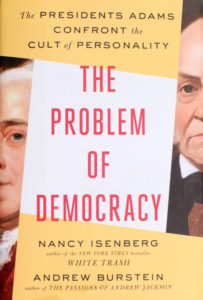Lecture Date: February 25, 2020
The Parrish Snead Franklin Simpson, PLC Lecture

The two presidents Adams have never been examined together, either as mutually supportive father-and-son historical actors, or as experienced men of the world with interconnected philosophies. History conveniently paints them as out-of-touch, each turned out of office by popularly cast southerners, Jefferson and Jackson; their rejection at the polls is explained in terms of their supposed resistance to a rising democratic spirit. The Problem of Democracy, our first major collaboration since Madison and Jefferson (2010), elaborates on the Adamses’ constitutional thought in favor of strong institutional checks in government (as a counter to the myth of an all-knowing popular will); their critique of democracy’s tendency to “dress up” select political men as popular celebrities: in their time, Benjamin Franklin, George Washington, Thomas Jefferson, and Andrew Jackson. Their concern about a moneyed oligarchy and their unwillingness to surrender personal political independence to the conforming character of the two-party system make them unique in the nation’s political life. The themes they embraced have clear implications for our times.
Speaker: Nancy Isenberg and Andrew Burstein

Nancy Isenberg is the T. Harry Williams Professor of American History at Louisiana State University, and the coauthor, with Andrew Burstein, of two books that address the enduring meaning of the American founding: The Politics of Democracy: The Presidents Adams Confront the Cult of Personality (2019) and Madison and Jefferson (2010). Her book White Trash: The 400 Year Untold History of Class in America (2016), spent three months on the New York Times bestseller list and earned her the #4 spot on Politico’s 50 most influential thinkers that year. She received high praise as well for her biography of one of America’s most controversial figures, Fallen Founder: The Life of Aaron Burr, which, along with White Trash, was a finalist for the Los Angeles Times Book Prize; and she established herself early on as an interpreter of the origins of the women’s rights movement, in Sex and Citizenship in Antebellum America (1997), recipient of the “best book” award from the Society for Historians of the Early American Republic (SHEAR). She has published social criticism and weighed in on contemporary politics in the Washington Post and other national publications. Professor Isenberg received her B.A. from Rutgers University and her Ph. D. in History from the University of Wisconsin––Madison.
Andrew Burstein is the Charles P. Manship Professor of History at Louisiana State University, and the author of eleven books, including the two he coauthored with Nancy Isenberg: The Politics of Democracy and Madison and Jefferson. A nationally recognized scholar of Jeffersonian era politics and culture, he has authored five books that directly concern the life and legacy of Thomas Jefferson: The Inner Jefferson (1995), Letters from the Head and Heart: Writings of Thomas Jefferson (2002), Jefferson’s Secrets: Death and Desire at Monticello (2005), and Democracy’s Muse: How Thomas Jefferson Became an FDR Liberal, a Reagan Republican, and a Tea Party Fanatic, All the While Being Dead (2015). Among his other books are The Passions of Andrew Jackson, a main selection of the History Book Club; The Original Knickerbocker (2007), the only full-length biography of literary icon Washington Irving written by a professional historian; and a literal, even visceral examination of the “American dream,” Lincoln Dreamt He Died: The Midnight Visions of Remarkable Americans from Colonial Times to Freud (2013). He has published journal articles and contributed book chapters in edited volumes on Jefferson’s life and times and notably appeared in the Ken Burns PBS documentary, “Thomas Jefferson.” Professor Burstein received a B.A. from Columbia University and earned his Ph. D. from the University of Virginia.